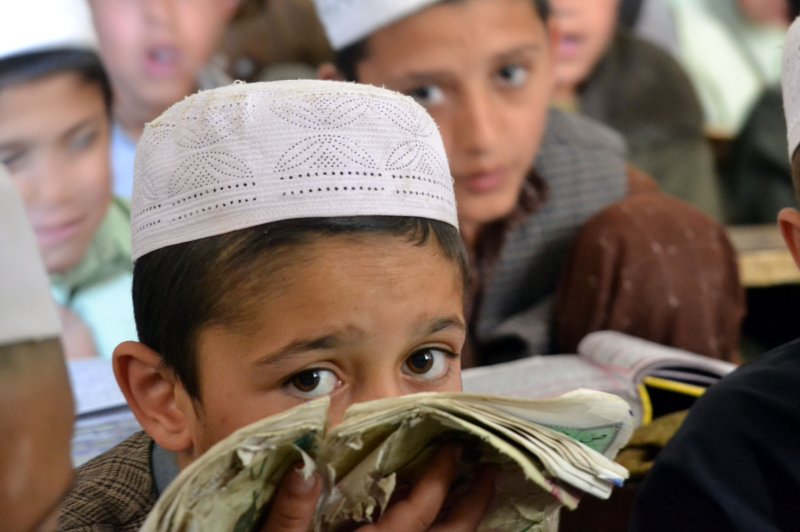1 of 9 | A boy studies during class at the Al-Jamia Islamia school, which does not accept foreign funding, in Allam town, Chaman, Pakistan. Many seminaries in Pakistan offer free education to children. Photo by Matiullah Achakzai/News Lens Pakistan
LAHORE, Pakistan, April 10 (News Lens Pakistan) -- Pakistan's largest province is increasing efforts to block millions of dollars in illegal overseas funding to thousands of religious schools considered nurseries for violent extremists, officials say.
Mushtaq Sukhera, Punjab's provincial police chief, told Pakistan's Senate on March 4 that about 150 such madrassas were getting financial aid from foreign countries.
A joint report by provincial police chiefs, presented to the Senate in January by Interior Minister Baligur Rehmen, said 23 religious schools across Pakistan were getting funds from the Middle East, Iran and the Gulf states of Qatar, United Arab Emirates and Kuwait.
Punjab's home minister, retired army Col. Shuja Khanzada, told News Lens Pakistan in early March that a survey had been launched to identify religious schools getting overseas illegal funding and their links to militants and sectarian activities.
"A draft bill is being prepared by the law ministry which would be introduced in the Provincial Assembly of Punjab soon. After the bill is approved by two-thirds majority of the parliament, it will become law," he said.
He would not give a time frame but said, "In a couple of months, the law will be effective, which would allow the government to check record of funding, names of contributors, purpose of funding, audit them, etc."
He said funding from foreign countries is given to dozens of religious seminaries, mosques and charities in Punjab.
"Foreign funding from Muslim countries of the Middle East is given to religious seminaries, which is used by some seminaries for militant and sectarian activities. Sympathizers of these seminaries in individual capacity collect money from Muslims residing in Europe, the United States, the Middle East and send it through illegal means. To stop this practice, the government has decided to introduce legislation and formulate a comprehensive policy under the National Action Plan to quell terrorism from the country," Khanzada said.
Khanzada said there are about 6,500 madrassas in Punjab.
"After the legislation and policy, the government will keep check on funding of seminaries, their accounts, purpose of funding and financial sources. The government will conduct audits so that the foreign funding is not used for anarchy in the province," he added.
Political analyst Ayesha Siddiqa cautioned that as much madrassa funding is secret, the government will need to be more serious in its monitoring and investigation of the funding sources.
"Secret funding is a big issue, and that should be given top priority over everything else, since there are many seminaries which are directly or indirectly run by banned outfits and funded secretly," she said.
Links between the religious schools and extremists run deep, Siddiqa said.
"Religious seminary students live in such an environment that they learn to hate people of other sects. The seminaries breed extremism and religious fanaticism," she said.
According to Wafaq ul Madaris, the national educational board for seminary students, which oversees religious schools, there are 19,504 such schools registered in Pakistan, with 114,447 teachers and 2.3 million students.
Khanzada said funding is mostly sent to religious schools illegal means by supporters and sympathizers.
"The sympathizers collect money in the name of charity abroad from people on pretext of helping the poor getting religious education in these seminaries, and it becomes problematic when it gives rise to religious sectarianism, extremism and terrorism," he said.
He would not comment about the amount of funding to seminaries.
On the domestic level, some ordinary citizens and the rich, especially businessmen, give charity to these madrassas as part of their religious duty to help the poor, Khanzada said.
The federal government has directed all provinces to establish a clear policy on funding of religous schools, former Punjab provincial law minister Rana Sana Ullah said.
"The provincial authorities will deal with legal, illegal and secret sources of funding. The provinces are responsible for monitoring legal funding and countering illegal and secret sources of funding," he told News Lens.
Pakistan set out a National Action Plan after the Dec. 16 school attack in which 134 children and 16 teachers were killed in their classrooms by militants.
Under the plan, the government formed strategies, framed policies and initiated steps to tackle terrorism.
Abdul Rahim Ashrafi, director of a religious seminary called Jamia Rehmya in Lahore, said
restrictions on Islamic seminaries were part of a conspiracy by forces opposed to Islam.
"The enemies of Islam had hatched a conspiracy against religious seminaries which were hub of Islamic teachings," Ashrafi told News Lens.
"Anti-Islam forces first staged the Peshawar incident so that our government would be compelled to take action against these sacred places where the Koran is taught. At present, seminaries are facing their toughest time in history due to government moves against them," he said.
"Frankly speaking, a seminary is run by Almighty Allah where His holy book the Koran is recited frequently. There is no permanent income of my seminary, but all affairs run smooth due to His blessings," he said.
Ashrafi said the heads of each school collect funding, donations, appoint teachers and conduct
examinations. Students pay nothing. The families choose to send their children to seminaries mostly due to poverty.
The seminaries provide free education and accommodation to students, unlike state-run educational institutions. He said the government provides a nominal amount to madrassas annually besides giving some aid for projects like computer centers.
Discussing government monitoring of funding, he said the government wants complete control over the schools, which religious scholars would not allow at any cost.















